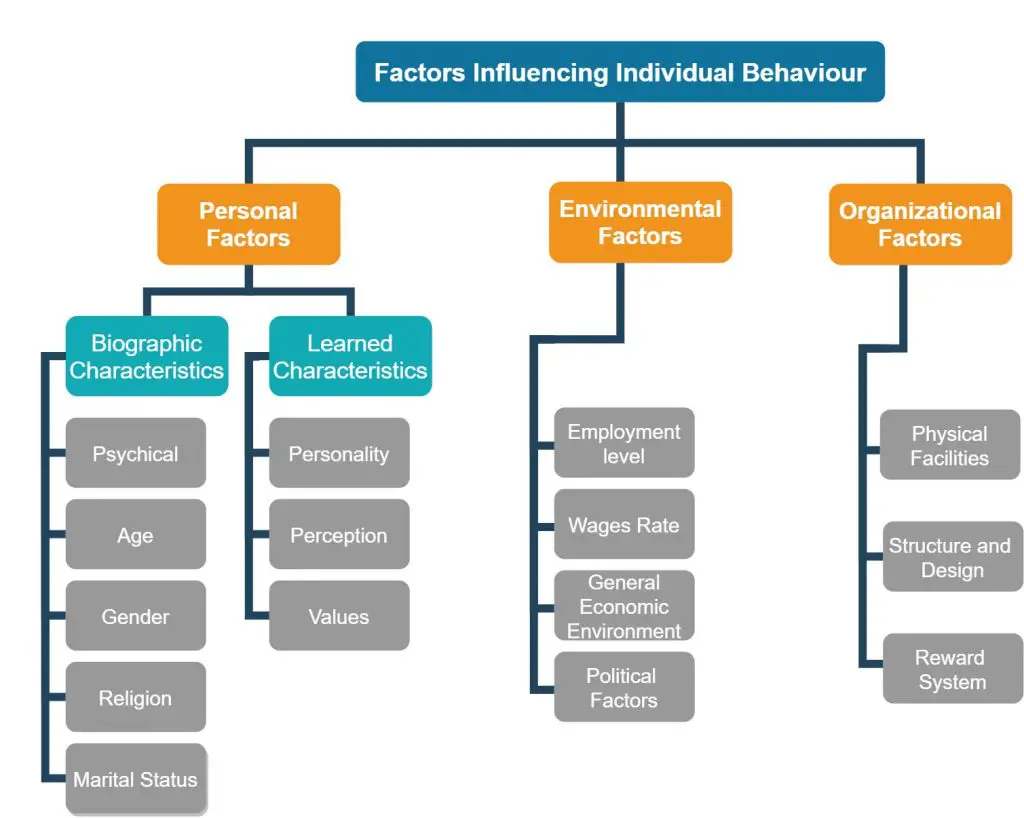Contents
Meaning of Individual Behaviour
Individual behaviour refers to the way in which an individual reacts or behaves at his place of work. It can be defined as a combination of reactions to internal and external stimuli. Individual behaviour defines how a person will respond under distinct conditions and will express different emotions such as happiness, rudeness, love, anger etc. It refers to some concrete action by an individual. Study of individual behaviour reveals the behaviour of human at the working environment. Behaviour of an individual have a great influence on the performance of organization. Positive behaviour will lead to enhance the productivity. Whereas on another hand, negative behaviour will cause damages and bring heavy losses for company.
Factors Influencing Individual Behaviour
Various factors affecting the individual behaviour is classified into following categories: –
- Personal Factors
- Environmental Factors
- Organizational Factors
Personal Factors
Personal factors are of 2 types: Biographic and Learned Characteristics
Biographic Characteristics: Biographic characteristics are genetic nature and are inherited by individual by their parents or forefathers. These are gifted features that an individual possesses by birth. All of these biographic characteristics are listed below: –
- Psychical Characteristics- Personal characteristics relates to skin, complexion, vision, height, weight, size of nose etc. which influence the performance of individual. A person with good physical characteristics have an attractive personality, they dress well and behave gently in an organization.
- Age- Age is an individual inherited characteristic that is determined by date of birth. Young people are expected to be more efficient, energetic, risk-taking, innovative and ambitious.
- Gender- Gender is an inherited characteristic as being a men or women is genetic in nature. Woman are expected to be more emotional than men and generates high turnover rates. It is due to more likeness of woman quitting their job citing personal reasons.
- Religion- Religious values of individual influence distinct aspects of his/her behaviour in organization. Highly religious person is stricter towards following moral values, ethics and code of conduct while performing their roles.
- Marital Status- Researcher indicated that with marital status, responsibilities of individual get inclined and for them having steady proper job becomes more important. Such employees have less absences, low turnovers and more job satisfaction.
Learned Characteristics: Learned characteristics refers to the changes in persons behaviour that comes from his/her interactions with environment.
- Personality- Personality solely do not refer to physical characteristics of person but indicates the growth of individual’s psychological system. These are the personal traits of persons that comprises of patience, extrovertness, dominance, aggressiveness etc.
- Perception- It is a viewpoint of individual through which it interprets a particular situation. Perception is defined as a process via which information enters mind and an interpretation takes place for providing some sensible meaning to world.
- Values- These are global beliefs that guides distinct actions and judgements in several situations. It comprises of idea of an individual that is based on good, right and desirable opinions.

Environmental Factors
The external environment has an effective role in influencing the individual behaviour.
- Employment level- Employment opportunities available within the country act as a major determinant of individual behaviour. In case of less employment opportunities, he/she will remain stick to same job level irrespective of how much satisfaction is attained. However, if there are more employment opportunities available then employees will shift to other jobs.
- Wages Rate- Monetary compensation is a major factor that every employee considers before joining any organization. Therefore, a decision whether to stay in a particular company or shift anywhere else is taken on the basis of wages he/she is getting.
- General Economic Environment- Economic cycle in a country greatly influences the behaviour of individual in an organization. They are subject to retrenchment and layoffs. Job security and a stable income are the most relevant factors of motivation for these type of employees. Whereas, employees of public sector undertakings are not affected by economic position within the country as they receive their fixed salaries irrespective of economic conditions.
- Political Factors- Political factors indirectly influences the behaviour of an individual. In a politically stable environment, there will be large opportunities of steady job positions. It will provide better freedom to individual which will influence their career choice, performance and jib design.
Organizational Factors
Wide range of organizational factors influence behaviour of individual which are listed below: –
- Physical Facilities- Physical environment at work place have a great influence on behaviour of individual. It comprises of factors like lighting, cleanliness, heat, noise level, office furnishing, strength of workers etc.
- Structure and Design- It is concerned with set-up design of departments within an organization. Individual behaviour is influenced by where an individual perfectly fits in a hierarchy of organization.
- Reward System- Fair reward system adopted by company for compensating its employees enhances the overall performance and behaviour of individual.